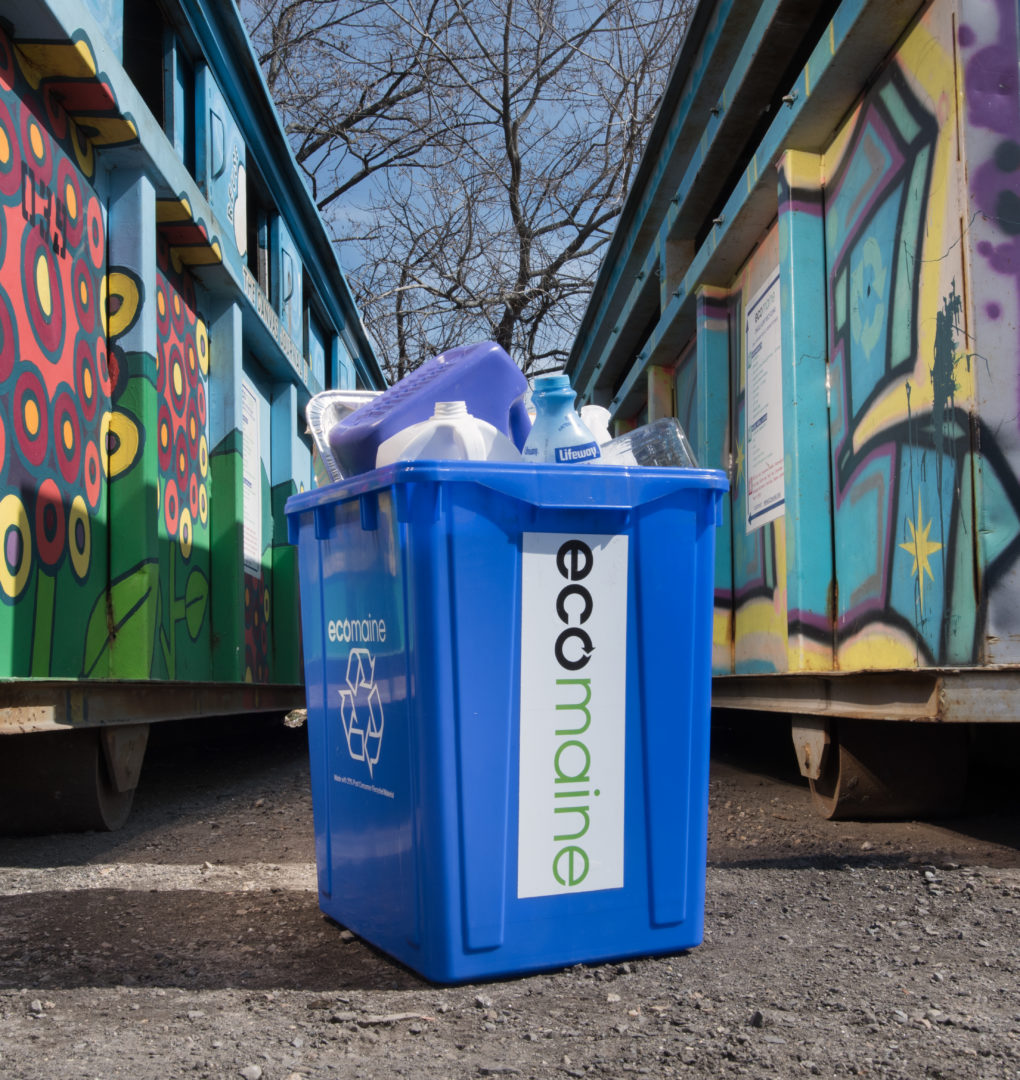Occasionally, ecomaine holds education sessions for our member towns’ staff, transfer station workers, and recycling/solid waste committee members to answer questions and clear up some misconceptions. We have collected some of the frequently asked questions and answers below.
To see the 2018 Education Session Powerpoint presentations, click here.
If you’d like to watch the video of our May 2018 Education Session, see below, from South Portland Community Television.
Frequently Asked Questions
General
Is [SPECIFIC ITEM] recyclable?
This is THE MOST frequently asked FAQ! Direct folks to try the Recyclopedia, the online database we created for all their recycling questions. This can be found for free in the app store on smart phones or simply online at ecomaine.org/recyclopedia. We also make the Recyclopedia a widget that your town or city can add to its own webpage for free – see the media kit at the Recyclopedia website for instructions and promotion tips.
Folks can always call us as well, at 207-773-1738.
Recently, what is the new change in recycling?
The most significant change over the last few years is that China is no longer accepting plastics and paper to recycle. (ecomaine’s plastics are exceptionally well-sorted and clean, plus we don’t send our plastics to China so we are mainly affected by the market for recyclable paper.)
We are seeing contamination coming from all of our member towns; since China and others have cracked down on acceptable contamination, now we all must as well. ecomaine has an inspector standing on our recycling tip floor to check incoming loads and we are charging for contamination.
If you’re a public works staffer, what does this mean for your town? We all share in the responsibility of cleaning up contamination; ecomaine’s 450,000 customers as a whole need to do a better job of keeping the unwanted stuff out of our recycling loads. This means watching the bins more, talking to folks when you see something wrong, or asking us or the Recyclopedia questions if you or your customers have them. We are not worried about the little bit of extra peanut butter or laundry detergent left in the container. What we are seeing coming through our lines are shoes, toasters, chainsaws, pillows, leaves and garden plants (real and fake), rope and electrical cords, half-emptied soda bottles, animal parts, etc. There’s no place in the recycling stream for these materials – that’s contamination.
How do I access updated promotional materials that are printable, for example, the Education and Outreach brochure?
Check out the following pages and resources:
- Our Recycling webpage for lists, the Recyclopedia, and our single-sort recycling brochure
- Our Resources page for posters, Dos and Don’ts, mailers, and more – many are customizable and translated into Spanish, French, and Arabic.
- Our Education page for information on tours, educational outreach, and that informational brochure
- Our Waste-to-Energy Facility’s page for information and our brochure on ecomaine’s Waste to Energy Plant.
You can also get in touch if you need specific items and can’t find them. We will be happy to point you in the right direction or drop them off/send you some in the mail. Call 207-773-1738 or email info@ecomaine.org.
Plastics
Do you take bags and plastic rigid containers? How small can plastic be?
ecomaine cannot accept bags in single-sort for three reasons:
- We used to take them in recycling bins, up until 2016. There was a small market for them, meaning we could sell them, but that is no longer the case.
- Grocery stores and many communities are starting to implement bag bans or fees and we are supportive of this approach, since it is part of our mission and adheres to the waste hierarchy (Reduce, Reuse, Recycle, Compost, Waste-to-Energy, Landfill).
- Plastic bags gum up the machines we use to sort paper and cardboard, rubber sorting stars on axles (see photos below).
Options for disposing of bags include:
- Reduce use in the first place through reusable shopping bags
- Reusing them in any way possible, like a small trash can liner or for pet waste, before putting them in the trash
- Simply putting the bags in the trash – they’ll go to ecomaine’s Waste to Energy plant, where they’ll be turned into electricity!
- Bring them to stores like Hannaford, Shaw’s, Walmart and Target (find your local locations and what types of bags and films are acceptable at www.plasticfilmrecycling.org)
Ecomaine accepts all rigid (meaning not soft or able to be crumpled in your hand like a bag would) plastic containers labeled #1-#7. Examples include berry containers, ketchup bottles, milk jugs, yogurt cups and so much more.
Plastic must meet requirements above (#1-7, rigid, container) no matter the size. For example: a water bottle cap is too small and will potentially fall through our sorting mechanisms, is not a container and often isn’t labeled.
But if you leave the caps on your bottles, they will be recycled, as typically, bottles are made of #1 or #2 and caps are typically made of #2 or #5. The different types of plastic either sink or float and are separated from each other in the process of turning into something new!
Up until recently, you took my recycling in plastic bags? Why not anymore?
Actually, ecomaine has never allowed recyclables to be bagged in any color bag, but up until recently, this rule was not enforced. (The ONE exception to this is shredded paper in a a clear plastic bag.) Now that the Chinese National Government is no longer accepting paper from ecomaine, or anywhere in the world, we need to crack down the amount of contamination of any kind coming in the door. Contamination is anything that ecomaine cannot sort and sell off as recyclable material. Bags are a huge source of contamination for us (see answer 4 above for options for plastic bags).
Often items are marked with a symbol or number but are not truly recyclable. Which “plastic” items are actually recyclable?
Each recycling facility decides what they can and cannot sort and sell. As above, ecomaine can sort and sell #1-7 rigid plastic containers as acceptable items. So, things like straws, pen caps, and to-go coffee tops are not acceptable materials for us.
Just a couple of examples of other items that might have a symbol are dog or horse food bags (#5), computer batteries, and propane tanks. These all have a symbol if not a symbol and number on them but items like these aren’t recyclable because there is either no market (dog food bags) to sell them off or they are dangerous (battery and propane tank).
The best – and easiest – way to find out which bin it goes in is to check ecomaine’s Recyclopedia or lists.
How can municipalities best share the message about plastic bags and films?
Signage is always helpful, as well as having copious information on your town’s website and social media accounts. See ecomaine’s customizable resources here for some ideas.
And definitely give the Recyclopedia a shot! Your town can embed it right on your own site – see our media kit for all the help you need, and if that’s not enough, drop us a line!
For single-use bags and films that are already out there, you can promote reuse. Reuse of these items could be keeping bubble wrap in a drawer for future shipping/packing needs, and bags can be used for so many different uses from getting produce from the store/farmers market to lining trash cans, carrying gym clothes, or picking up pet waste.
Recycling of these clean and empty bags CAN occur but NOT in your recycling bin. Visit plasticfilmrecycling.org to find grocery and department stores who accept films and which types they are looking for.
How about five gallon buckets? Are they recyclable?
Yes they are! We don’t really want anything larger than a five gallon bucket as it may be too large to go through our system. If you’re able to remove then handle and put it in either the metal bin or single sort bin, go for it! If you’re not able to remove it, that’s no problem. We will recycle the bucket, handle and all.
Hazardous Waste
Why don’t you take waste oil and recycle it?
ecomaine doesn’t accept oil for recycling purposes because we are not set up for this process. If a very small amount comes in, we can put it aside and properly dispose of it (at a cost to us) because we are committed to proper waste disposal if such items do make their way here.
For transfer stations who don’t take waste oil, there are often places nearby that will accept it. For one example, Fryeburg has Pete’s Garage – and when we called them, they said they take waste oil to heat their building using a clean burn waste oil heater. Pretty neat! Other facilities will recycle it in some way, like Maine Standard Biofuels turns waste cooking oil and turns it into bioheat, biodiesel and cleaning products.
Find locations near your town HERE and don’t forget to call the facility before you tell folks to drop off oil there, as this DEP’s list was last updated in 2013.
Where can I dispose of old paint and pesticides?
Paintcare.org for the paint recycling! Hardware stores and paint stores are often good places to take old paint. You can type in your zip code on Paintcare.org to find places near you. Some transfer stations accept paint as well and if you are interested in becoming a drop-off sit, you can find that information here.
Pesticides are a bit trickier because they need to be taken to specific places or wait for a local hazardous household waste disposal day. Two places you can take this now are Riverside Recycling in Portland and Maine Environmental Depot in Lewiston.
Also, from the DEP website: To dispose of unwanted pesticides, call the Board of Pesticide Control at 207-287-2731 to find out when they will be holding a collection in your area.
And here are two great sites for information on disposing of electronics, florescent bulbs and mercury-containing thermostats:
What can I do with small empty propane tanks?
These are best taken back to hardware stores or transfer stations. Call your local locations to see if this is something they will accept (as all locations vary on what they will and won’t take). You can also put them in the trash as a last resort. They will be taken out by a large magnet before going to the landfill in the ash truck.
Currently, only ferrous metals are removed from the trash and recycled separately as post-burn metal. No other recyclable materials are removed so please put all cardboard, paper, plastic, metal containers and glass containers in your recycling bin.
Contamination
Sometimes, residents still put trash in their curbside recycling bins. How do I encourage proper use?
Try having the haulers check the bins and leave any that are contaminated. Numerous towns are doing just that to avoid contamination fees. It takes advance communication with residents to avoid unhappy calls, but the results are a much cleaner load!
Helping the residents understand that it is potentially their tax paying dollars that are wasted when they contaminate could also be helpful. We hear the argument “but I pay taxes, why should have to pay more?” Well, imagine how much higher taxes would be if they had to pay for their own and everyone else’s contamination!
How can we manage contamination in silver bullets in remote areas?
Some solutions include: video surveillance and fining violations; tabling at the location to hand out and share information; and posting signage in front of each location stating acceptable recyclables and/or that their tax dollars are being wasted to clean up contamination. ecomaine has educational staff to conduct this kind of in-person outreach. Feel free to email info@ecomaine.org to get in touch.
Construction Materials
How to dispose of electrical wire?
Electrical wire should be treated as electronic waste and can be brought to your local transfer station. Some communities hold special electronic waste collection events once or twice per year. For more information, click here.
How can I throw out sheet rock?
Sheet rock should not be delivered to the recycling facility or be placed in curbside bins. As it is made of gypsum plaster, no part of it is recyclable. It can either be delivered to your local transfer station under construction and demo or, if in good condition, donated to Habitat for Humanity.
How do I recycle old windows with the glass still in them?
Habitat for Humanity often accepts building materials; check with your local store. If not, these should be brought to your local transfer station as it would be dangerous if brought to our recycling facility.
About ecomaine
What does it mean to be community-owned?
ecomaine is a quasi-municipal, 501(c)3 nonprofit organization which means we operate with a mission and work to serve our owner, contract, and associate communities. Being community-owned means ecomaine is run by a Board of Directors with at least one representative from each of the 20 owner communities. Our mission, on behalf of our community owners and members alike, is: ecomaine provides comprehensive long-term solid waste solutions in a safe, environmentally responsible, economically sound manner, and is a leader in raising public awareness of sustainable waste management strategies.
ecomaine was founded in 1976, originally under the name Regional Waste Services, by Cape Elizabeth, Portland, Scarborough, and South Portland, in response to a (then) new Maine law that called for the closing of privately and publically owned landfills. These four communities wanted a voice in the way their waste was being handled and since then, sixteen additional municipalities have made further investments in ecomaine to become owner communities.
How is the Board of Directors elected?
Board members are not elected. ecomaine’s by-laws require that members be appointed by a municipality’s governing body. For example, some appointments are made by a community’s board of selectman, others are made by the mayor. The number of representatives appointed to represent each community is based on a five-year average of trash tonnage.
Where does all our trash and recycling go?
Some ecomaine member communities have their trash and recycling brought to ecomaine. Other member communities have either trash or recycling processed by ecomaine. To see if your community has their trash and/or recycling to ecomaine, you can use the filters in our Community Recycling Comparison Tool.
Trash that comes to ecomaine gets mass-burned in an environmentally-responsible way – and enough energy is recovered powers our facilities, plus an additional 15,000 homes! A more detailed explanation of the process can be found here. Recycling that comes to ecomaine gets sorted in our recycling facility, baled, and then sold on the global commodities market to make new things. For more details about the sorting process, click here.
My trash and recycling all seem to go into the same truck. How do recyclables get recovered?
Many haulers have trucks with two compartments, one for recycling and one for trash. This allows the hauler to use one truck to collect both types of waste, eliminating the need for a second truck on the road for the same route. From the curb, it often looks like the recycling and trash are being dumped into the same compartments when really they are being dumped into two different ones either by an automated arm or the people working on the truck. For more information on your specific hauler, you can contact your community’s public works department.
By only putting materials accepted by ecomaine in the recycling bin, you and your residents are helping keep our employees safe and keep costs down for everyone. Thank you!







